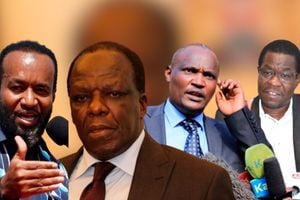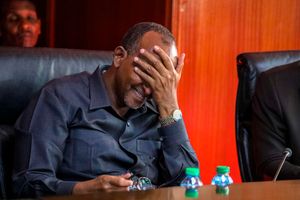
Raila Odinga.
Last-minute pressure by some family members and individuals who had been tipped to join Cabinet made Mr Raila Odinga finally submit names for Cabinet nomination by President William Ruto.
Mr Odinga’s change of heart after a week of conflicting signals saw four of his close allies nominated, in a move that was largely expected after the President announced plans to form a “broad-based” government as a way out of the current political crisis triggered by the youth-led protests.
The four are National ODM Chairman and nominated MP John Mbadi (National Treasury and Economic Planning), ODM deputy party leaders Hassan Joho (Mining, Blue Economy and Maritime Affairs) and Wycliffe Oparanya (Co-operatives and Micro, Small and Medium Enterprises), and National Assembly Minority Leader Opiyo Wandayi (Energy and Petroleum).
“I commend the leadership of diverse organisations, both in the public and private sectors, including political parties, for their encouraging response to my outreach to consult on forming a broad-based government. Their willingness to set aside partisan positions and interests in order to join a visionary partnership for the radical transformation of Kenya is a historic gesture of their patriotism,” said President Ruto when he made the announcement.
Others nominated by President Ruto are Salim Mvurya (Investments, Trade and Industry), Rebecca Miano (Tourism and Wildlife), Kipchumba Murkomen (Youth Affairs, Creative Economy and Sports), Dr Alfred Mutua (Labour and Social Protection) and Justin Muturi (Public Service). Ms Stella Langa’t, a new face in the list, has been nominated to the Gender and Culture docket.
Before the nomination, Mr Odinga was under pressure from within Azimio la Umoja One Kenya Coalition and ODM to reject any deal with the besieged Kenya Kwanza administration. His long-time friend and Siaya Governor James Orengo was also opposed to ODM taking up the slots.
The Nation has learnt that the politicians who were lined up to join the Cabinet told Mr Odinga that their political careers were on the line if the deal failed. One of the nominees said that the public backlash that was awaiting them was huge as they were going to be seen as traitors and opportunists.
Mr Odinga’s wife Ida and his elder brother Oburu Oginga also played a key role in ensuring the deal sailed through.
Last Thursday night, Mr Odinga was briefed by his team that was negotiating with President Ruto over the slots and they convinced him to take the offer as it was “good for his people”. The meeting was attended by former Raphael Tuju, Junet Mohammed, Mr Oginga, long-time confidante Mr Joe Ager and Adams Oloo.
In particular, the team told Mr Odinga that the Ministry of Cooperatives and MSME would be highly appreciated by his political base.
The fear of tearing the party apart was also presented to Mr Odinga on Tuesday evening as factions had already started emerging. A camp led by Mr Orengo was against members of the party accepting Cabinet slots. Mr Orengo on Wednesday, July 24, continued with his opposition to the deal.
“Principle is indivisible; it is either wholly kept or wholly sacrificed,” said Mr Orengo. “Taking CS positions in the name of ODM betrays the principles of the constitution and the progressive movement which the party represents. It’s all absolute treachery and an act of political cannibalism.”
Mr Odinga is facing a possible public backlash from the protesting youth, who are likely to perceive him as an opportunist ready to benefit from their agitation for good governance.
In a statement on Tuesday, ODM Secretary-General Edwin Sifuna said ODM was not in any negotiations with Kenya Kwanza.
He said the party maintains its unwavering position in support of the ongoing struggle to address the long-standing governance issues, insisting that the only way forward is through an honest, all-inclusive national conversation.
“As a party, we wish to make it unequivocally clear that we are not in negotiations with the Ruto regime for any coalition or political arrangement,” said Mr Sifuna.
The party went further to warn its members against making themselves available to join the Cabinet, stating that any member who takes up any slot would be doing so as an individual without the support of the party.










